| |
"When I was still in high school, I was often patronised by teachers who were telling me what I should do to be happy: have a career, be ambitious, study. That's why I was always fascinated with these handymen at school, or people working on football pitches… to me, they felt like people without ambition, people who were not slaves to the norms of society." |
| |
Patrick director and co-writer Tim Mileants interviewed in CineEuropa* |
I've probably mentioned this before, but I'm a bit of a sucker for filmmaking that informs us about its characters, setting and story through visual cues instead of opening captions or text crawls or expository dialogue. With that in mind, consider the opening scenes of the unassumingly titled 2019 drama Patrick. A wide shot of a tree-topped cliff face tilts down and descends towards the image of a naked man (Kevin Janssens) floating restfully in the lake below. When he gets out, instead of dressing as expected he walks naked through the woodland and into a populated clearing. The fact that everyone he passes is also naked and this clearing is peppered with tents, caravans and picnic tables tells us this is a naturist holiday camp. That everyone greets the man warmly as Patrick as he passes suggests that he is more than just another holidaymaker. His body language and his lack of social skills suggest he is unusually reserved, or even low-level autistic, while the fact that he works as a handyman is communicated by the brief montage of shots that follow him doing repair jobs around the camp. We learn that Rudy (Josse De Pauw) runs the camp when we watch him checking in two new arrivals, and that he is Patrick's father when the two sit down for family dinner. That Rudy is in poor health is signalled by the oxygen tube he wears even whilst eating, and that his wife Nelly (Katelijne Damen) is blind by the way she pours soup into a bowl, using her finger rather than her eyes to gauge when it is almost full. We also know that one of Patrick's hammers has gone mysteriously missing from the look that crosses his face as he fixates on the space on his wall rack where it would normally sit. All of this is established in the first unhurried five minutes of the film, and the only dialogue of note comes in the form of the greetings offered to the titular Patrick as he passes the holidaymakers and Rudy's brief checking in of the new guests. As a result, the film already had my complete attention.
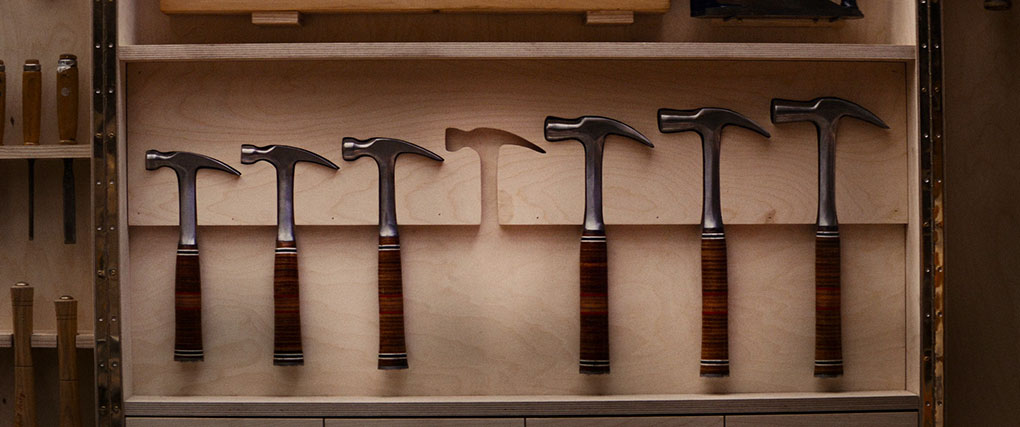
The missing hammer, which begins as a seemingly minor plot point, grows to become the narrative core of the film. Initially, Patrick's obsession with its absence has an OCD ring about it, emphasised by the scrupulously tidy and orderly manner in which the hammers are arranged on the wall. It's a perception that peaks when female holidaymaker Liliane (Ariane van Vliet) leaves her husband Herman (Pierre Bokma) breakfasting one morning to pay a visit to Patrick for what is clearly a regular sexual liaison, and as she energetically rides him and calls out his name, his distracted eyes become locked on the space on the wall where the absent hammer would normally be. But it's when his father collapses, is whisked off to hospital and ultimately dies that Patrick's search for the hammer really intensifies. Leads are followed that trigger other avenues of investigation that result in dead ends. A visit to a hardware shop that appears to stock just about everything a handyman could want** reveals that the manufacturer stopped making that particular hammer six years ago. The replacement suggested by the shop's proprietor not only looks out of place alongside the other hammers in the set, it does a lousy job of banging in a nail, so ends up in the bin, an action that becomes unexpectedly relevant later.
It quickly becomes evident that Patrick's inability to come to terms with the loss of his hammer is really all about his suppressed grief over the death of his father. What surprises is that the film openly acknowledges this, first when Liliane psychoanalyses Patrick's obsession, and later when family friend and local policeman Mon (Bouli Lanners) points out that finding his hammer won't bring his father back. It's a rare example of a film openly acknowledging its subtext as part of its text, but this in no way weakens the strength or validity of this particular metaphor, and I'm speaking from personal experience here. If you're young enough not to have experienced grief, then worry not, your time will come, but if you have and you were able to confront it head on, then I salute you. When my father died, I had already dealt with one emotionally devastating loss, but this time I was required by circumstance to sit on my feelings to take care of my mother and sort out all of the legal and logistical issues for her. And when you do that you sometimes obsess about the smallest things, or project your feelings onto a disassociated activity. I was able-bodied back then and exercising regularly, and on the day of my father's death, I ran harder and for longer than I've probably ever done in my life, pushing myself to the point where my legs no longer wanted to support me. I had no logical reason for doing so, I just felt the need to exhaust myself physically before returning to my post-mortem duties. If someone had attempted to prevent me or rationalise my actions I'd have pushed them aside and run anyway. Thus to me, and I'm sure to many who have found unconventional ways of postponing the impact of an emotionally painful event, Patrick's single-minded quest to locate his hammer following his father's death makes perfect, if illogical, sense.
In the course of his search, Patrick's interactions with the campers reveal something about each of them, and in turn about Patrick and his relationship with them. These include Australian newcomer Dustin (Flight of the Conchords' Jemaine Clement), a famous musician who is taken aback that the insular Patrick has never heard of him, and later offers an oddly sound piece of advice when he tells him, "Sometimes, to get what you want, you have to not want what you want." So peculiarly pertinent is this comment that it's become something of a tagline for this film, being the final line of the trailer and printed in bold capitals on the back cover of the Blu-ray case. Dustin is joined a short while after by his young Dutch girlfriend and tour manager Nathalie (Hannah Hoekstra), who arrives to discover that he is already entertaining another (naked) female guest. Frustrated by her Bohemian boyfriend's refusal to take the prospect of them living together seriously, Nathalie is increasingly drawn to the distracted Patrick, hanging out in his workshop and opening up to him with an honesty you suspect would be wasted on Dustin. In a slow pan in which the two repeatedly shift location in a way that suggests some complex behind-the-scenes planning and execution, the two are eventually brought face-to-face in a moment that hovers on the brink of a kiss that never quite happens, which seems to capture the essence of their slowly unfolding – if initially one-way – friendship.
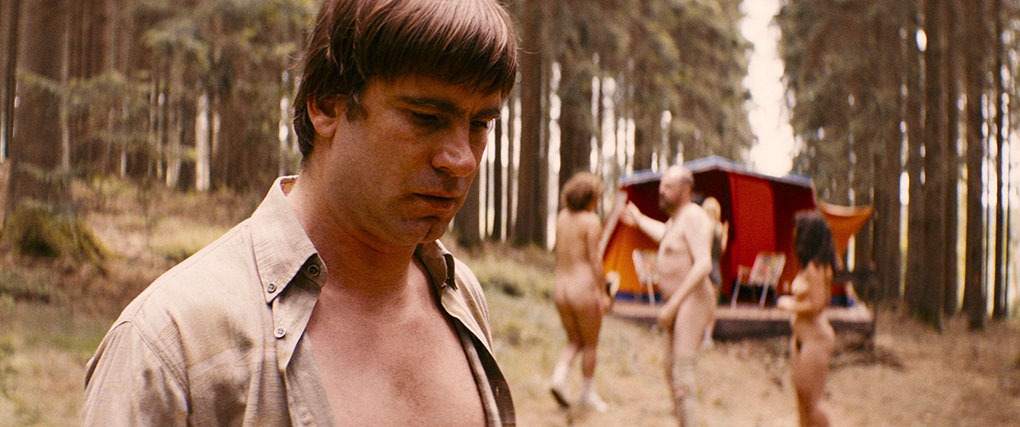
The naturist camp setting was apparently inspired by the childhood experiences of first-time director Tim Mielants (whose previous TV work includes series 3 of Peaky Blinders and two seasons of Legion), and the considerable amount of nudity on display never plays like the sales gimmick that the cynical might suspect it of being. The actors here were not selected from catalogues of the body beautiful, and instead are everyday representations of the human form, overweight, middle-aged, sun-weathered or just plain ordinary, much as so many of us are when we disrobe. I have to admit to never having stayed at a naturist camp, but every time I visit Japan I spent at least a few days at an onsen resort, where I strip off and bathe in pools of hot volcanic water with other naked males of all ages. The first time I visited I did so was a bit of a culture jolt, but over time I have come to really love these resorts, primarily for the relaxing a healing effects of the waters, but also because of the levelling effect that being naked with others tends to have. In these baths, road cleaners can bathe with company bosses, sewer workers with police chiefs, airport baggage handlers with neurosurgeons, and shorn as they are of the clothing that helps define their societal roles, they soak, converse and even drink together on equal terms. If you're ever in Japan, give an onsen a try – it's immensely relaxing, and rather liberating.***
In Patrick, the nudity has a similarly levelling effect, stripping characters of clothing that might normally – and perhaps even unconsciously – define their personalities, leaving us to judge them solely on their words and their actions. I also found that, just like the nakedness at an onsen bath, it's something you stop really being aware of as the story progresses and nudity gradually becomes the norm. That said, it does occasionally bring a surrealistic edge to otherwise straightforward exchanges, and also allows Mielants a moment of testicular fun when the camera tilts up from the metal balls of a game of boules to the genitals of the four male players. When clothing is worn, it is done so with purpose. The open shirt that hangs loose on Patrick's shoulders feels almost like a stand-in for a staff uniform (one he later and symbolically dispenses with), whilst Nathalie's disinterest in disrobing signals both the growing distance between her and the comfortably naked Dustin and her status as a lonely outsider. The decision to keep the youngest and prettiest female in the cast covered up also feels amusingly like a sly middle finger on Mielants' part to anyone tuning in for the nudity alone.
That the taciturn Patrick becomes a sounding board for the advice and life philosophies of others is both a familiar movie trope and an honest reflection of how such things often play out in the real world. It's a similar story with Herman and Liliane's attempts to manipulate Patrick into selling them the camp at what I'm guessing will be a knock-down price, simultaneously building support for their bid by badmouthing his managerial skills to the other campers. This, coupled with a suspicion-raising piece of physical evidence, leads to confrontation between Patrick and Herman that quickly develops into the film's funniest scene, as the two naked men wrestle angrily in Herman's caravan with a scrappiness that recalls the barbershop brawl in Imamura Shohei's The Eel, and builds to a level of physical aggression that tips the caravan over on its side. The only one apart from Nathalie who genuinely appears to have Patrick's welfare at heart is policeman Mon, who at one point puts his job on the line when Patrick's overwhelming desire to be reunited with his beloved hammer looks set to land him in serious trouble. That Mon has also become something of a surrogate parent to Patrick is cemented by a late film hug that directly echoes the last physical contact Patrick had with his biological father, one that helps to trigger the final release of Patrick's bottled-up grief.
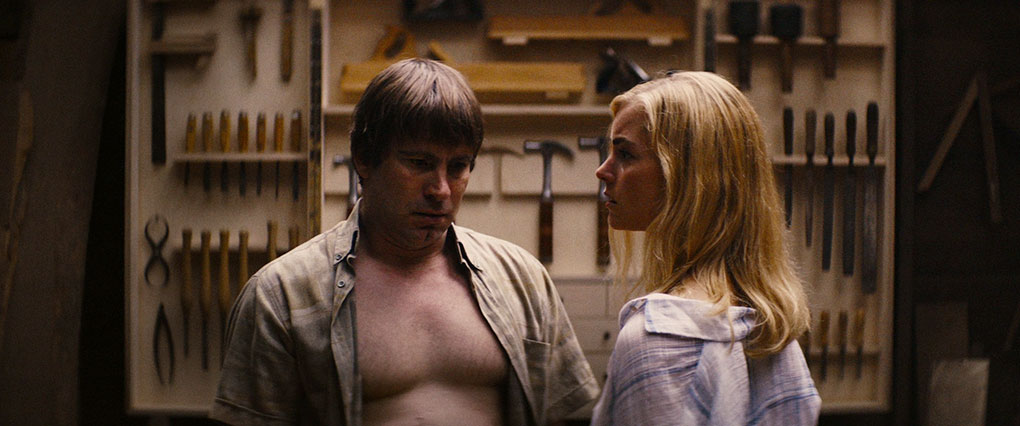
Despite all I've written above, I find it curiously hard to explain just what it is about Patrick that is so utterly beguiling. Much is down to Mielants' understated direction, whose economic storytelling has a sometimes melancholic tone that occasionally gives way to moments of dry comedy and filmmaking flair. My favourite example of the latter involves a circular pan that follows Patrick as he walks around the outside of the hall in which a meeting chaired by Herman to rally support for his cause is taking place, and the sound of the voices within becomes muffled every time Patrick moves from one window to another. Frank van den Eeden's handsome scope cinematography feels consistently at one with the natural setting, while its rare beauty shots – the extraordinary wide of the woodland scattering of Rudy's ashes, where naked campers stand motionless between the mist-shrouded trees to composer Geert Hellings's hauntingly beautiful score – are genuinely gobsmacking. But ultimately and rightly it's the performers who makes the characters and the story feel so compellingly real. This is particularly true of lead player Kevin Janssens, an actor known primarily for his action movies and who gained a considerable amount of weight for the part, and who could tell Patrick's story with his body language and expressions alone. That everyone in the film seems comfortable with their on-screen nudity is also crucial to selling their characters as real and why we quickly accept their nakedness as the healthy normality that it is. I only wish that British and American cinema – and society in general – was capable of taking such an unembarrassed and un-sexualised view of the naked human form. To paraphrase Joe Orton, "Let us take our clothes off, and face the world."
Patrick was shot digitally on an Arri Alexa Mini using V-lite anamorphic lenses, and the 1080p transfer on this Blu-ray – which is framed in the original aspect ratio of 1.39:1 – is unsurprisingly pristine. The contrast has punch, nailing the black levels without pummelling the darker areas, and the image is consistently sharp and the detail cleanly rendered. The colour is naturalistic but with a slight leaning towards the warm hues of the forest in which the camp is located, which feels completely in tune with the subject matter and setting. Being (I presume) sourced from a digital master of a digitally shot film, there's not a mark on it anywhere.
The DTS-HD Master Audio 5.1 surround track is an unsurprisingly and appropriately low-key affair. The dialogue is crystal clear, the music has fabulous depth and dynamic range, and the surrounds subtly enhance the ambient sound and give breadth to the score.
Optional English subtitles kick on by default for all the non-English dialogue (that's most of it), but can be switched off if preferred.
Commentary with Director Tim Mielants & Co-Writer Benjamin Sprengers
Conducted in fluent English, this commentary by director Tim Mielants and his co-screenwriter Benjamin Sprengers is as enjoyable as it is informative, and it's really informative. A blend of background information on the project and scene-specific information and anecdotes, it's packed with details on the filming and the source of story elements and character details. We learn that the project was inspired by Mielants' own childhood experiences of nudist camps, as well as the origins of the missing hammer story, the father's illness and the blindness of the mother. The two men talk about the shooting of specific scenes, the intended subtext and what others have read into it, the elements inspired by No Country for Old Men, Duel and Chris Ware's graphic novel, Jimmy Corrigan: The Smartest Kid on Earth, and the characters and actors, with Mielants revealing that Pierre Bokma only agreed to do the film if he would definitely be naked. I really enjoyed this.
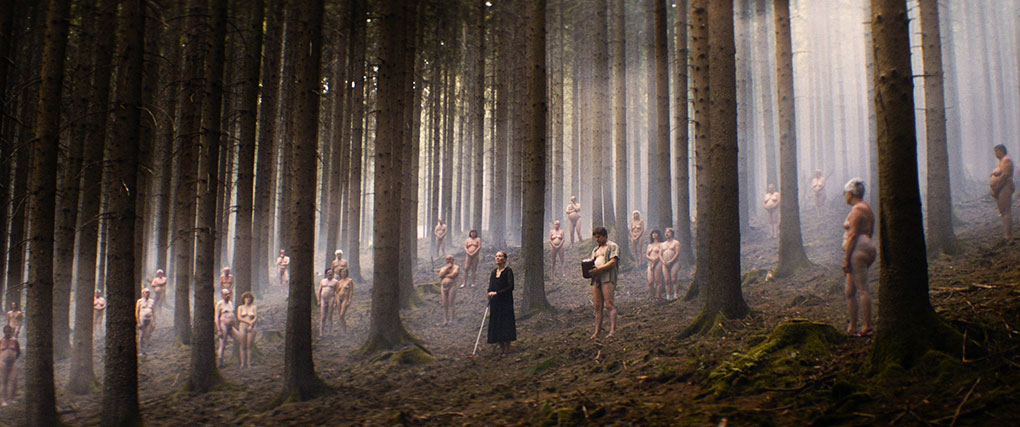
Making Of Featurette (15:56)
A featurette targeted at a domestic audience (everyone speaks in their native language here, which is subtitled in English) built around some welcome behind-the-scenes footage, and interviews with some of those involved in its making, including director Tim Mielants, and actors Kevin Janssens, Janne Desmet and Jermaine Clement. Some of the topics discussed by Mielants are also covered in the commentary, but there's still much that is new to this extra, and the footage of the shoot even includes a brief glimpse of an intriguing-looking deleted scene. In response to an unheard question about how he feels about the finished film, Mielants amusingly responds, "If someone else had made this movie, I would be fucking jealous. I would be like, 'Fuck you!' That is the only compliment I can give myself."
Interview with Director Tim Mielants (10:08)
With some of the remarks from his commentary repeated in his interview in the above featurette, I did approach disc-specific interview wondering if the same material was going to get a third airing. Well, in some respects, yes, but even watching this so soon after both of the above, I still got enough new information from it to fully justify its inclusion. Topics covered include how working in television helped prepare him for this shoot, the challenge of making several locations look like one, why he wanted Patrick to be overweight, the music score, the viewer who saw the film as a parable about the rise of fascism in the lead-up to the Second World War, and more.
Interview with Producer Bart Van Langendonck (8:48)
Here, producer Bart Van Langendonck outlines in English how he became involved with Patrick, why directors tend to come to him with specific projects, and the problems of selling a film with so much nudity, particularly when social media outlets are so puritanical about their content, a complaint I've been known to make on occasion. He talks about the response to the film at festivals and its multiple award nominations and wins, including what might sound like a novelty gong for Best Costume Design at the Film Festival Oostende, a win he justifies whilst also noting ironically that it beat a period film (Thieves of the Wood) for the prize.
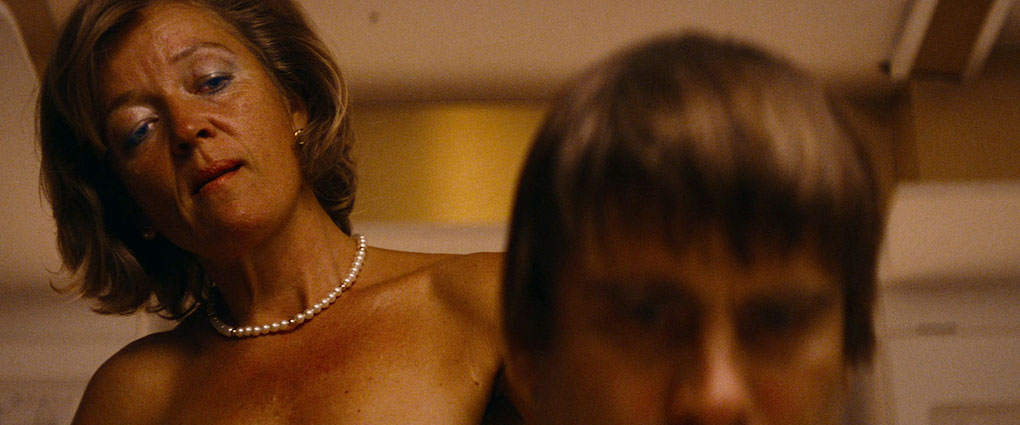
A Tale of Three Trailers
In an attempt to make a trailer that did not hit the restrictive "18" classification, and with nudity apparently still a touchy subject with the UK censors after all these years, the good people at Anti-Worlds made various versions, three of which are included here.
Original version (2:02) is a smartly assembled sell that ends on the line quoted above about finding what you want by not wanting it. This version is completely unembarrassed about the film's nudity, which I heartily salute.
Failed attempt at a lower certificate (1:41) adds big black boxes to the image to hide any hint of genitalia, buttocks, or female breasts. It does have a hint of "well, if you won't let us show nudity, we'll just have to do this" piss-taking about it, which did amuse me.
Successfully censored version (1:37) rather neatly edits around the nudity, but of course, doing so leaves potential viewers unprepared for one of the film's most distinctive features. I like to think a few prudes were startled as a result.
Funeral Music (1:39)
The beautifully shot and tenderly directed scene in which Rudy's ashes are scattered in the woods as the naked holidaymakers look on, accompanied by the full-length version of the cue composed by Belgian guitarist, singer and songwriter Geert Hellings for this sequence.
Booklet
Opening with the main credits for the film and a brief but useful profile of director Tim Mielants, the booklet then moves on to an essay by Wendy Ide, a rather lovely piece of observation and deconstruction that focusses primarily on the character of Patrick and his non-verbal communication. Following this is a longer and equally excellent essay by David Flint looking at the history of nudism in film, one that rightly calls out critics who react with disgust, suppressed arousal or infantile sniggering at the sight of naked bodies. Finishing things up are some welcome technical details about the shooting of the film – I wish more distributors would include this. As is usual for Anti-Worlds, the booklet is stylishly presented and printed on quality paper, and illustrated with promotional and behind-the-scenes stills from the film.
I somehow missed even reading about Patrick on its release and frankly thought it was terrific, and despite the title character's single-minded pursuit of his hammer at the expense of all else, I found myself strongly empathising with him and his state of mind. I've had to deal with grief more times than I care to remember now, and completely empathised with the notion of suppressing your true feelings through what others might regard as a trivial distraction. When it finally surfaces for Patrick, I had a strong recall to a time when I experienced a similar after-the-event explosion of emotion when I was least prepared for it. For a first feature, Patrick is a hell of an achievement, and it receives royal treatment on Anti-Worlds' excellent Blu-ray. If you find the sight of the naked human form somehow offensive, I'd look elsewhere, perhaps at your own naked self in a mirror. For everyone else, this comes warmly recommended.
|